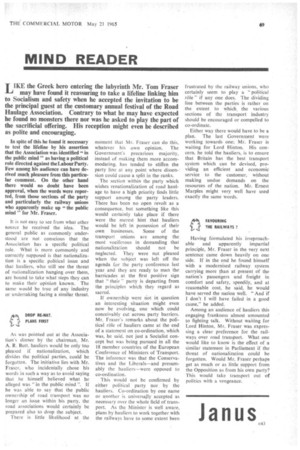MIND READER
Page 71

If you've noticed an error in this article please click here to report it so we can fix it.
LIKE the Greek hero entering the labyrinth Mr. Tom Fraser may have found it reassuring to take a lifeline linking him to Socialism and safety when he accepted the invitation to be the principal guest at the customary annual festival of the Road Haulage Association. Contrary to what he may have expected he found no monsters there nor was he asked to play the part of the sacrificial offering. His reception might even be described as polite and encouraging.
In spite of this he found it necessary to test the lifeline by his assertion that the Association was identified "in the public mind" as having a political role directed against theLabourParty. Few among his audience can have derived much pleasure from this particular comment. On the other hand there would no doubt have been approval, when the words were reported, from those sections of the party and particularly the railway unions who apparently make up "the public mind" for Mr. Fraser.
It is not easy to see from what other source he received the idea. The general public as commonly understood are not conscious that the Association has a specific political role. What is more commonly and correctly supposed is that nationalization is a specific political issue and that hauliers, who still see the threat of nationalization hanging over them, are bound to take what steps they can to make their opinion known. The same would be true of any industry or undertaking facing a similar threat.
DROP RE-NAT.
PLANS FIRST As was pointed out at the Association's dinner by the chairman, Mr. A. R. Butt, hauliers would be only too pleased if nationalization, which divides the political parties, could be forgotten. The initiative lies with Mr. Fraser, who incidentally chose his words in such a way as to avoid saying that he himself believed what he alleged was "in the public mind ". If he was able to say that the public ownership of road transport was no longer an issue within his party, the road associations would certainly he prepared also to drop the subject.
There is little likelihood at the moment that Mr. Fraser can do this, whatever his own opinion. The Government's precarious majority, instead of making them more accommodating. has tended to stiffen the party line at any point where dissen• sion could cause a split in the ranks.
The section within the party which wishes renationalization of road haulage to have a high priority finds little support among the party leaders. There has been no open revolt as a consequence, hut something like this would certainly take place if there were the merest hint that hauliers would be left in possession of their own businesses. Some of the transport unions are among the most vociferous in demanding that nationalization should not be neglected. They were not pleased when the subject was left off the agenda for the party conference last year and they are ready to man the barricades at the first positive sign that their party is departing from the principles which they regard as sacred.
if ownership were not in question an interesting situation 'might even now be evolving, one which could conceivably cut across party barriers. Mr. Fraser's remarks about the political role of hauliers came at the end of a statement on co-ordination, which was, he said, not just a Socialist concept but was being pursued in all the 18 member countries of the European Conference of Ministers of Transport. The inference was that the Conservatives and the Liberals—and presumably the hauliers—were opposed to co-ordination.
This would not be confirmed by either political party nor by the hauliers. Co-ordination by one name or another is universajly accepted as necessary over the whole field of transport. As the Minister is well aware, plans by hauliers to work together with the railways have to some extent been frustrated by the railway unions, who certainly seem to play a " political rOle " if any one does. The dividing line between the parties is rather on the extent to which, the various sections of the transport industry should be encouraged or compelled to co-ordinate.
Either way there would have to be a plan. The last Government were working towards one: Mr. Fraser is waiting for Lord Hinton. His concern, he told the hauliers, is to ensure that Britain has the best transport system which can be devised, providing an efficient and economic service to the customer, without making undue demands on the resources of the nation. Mr. Ernest Marples might very well have used exactly the same words.
FAVOURING THE RAILWAYS ?
Having fcirmulated his irreproachable and apparently impartial principle, Mr. Fraser in the very next sentence came down heavily on one side. If in the end he found himself with a modernised railway system carrying more than at present of the nation's passengers and freight in comfort and safety, speedily, and at reasonable cost, he said, he would have served the nation well. "And if I don't I will have failed in a good cause," he added.
Among an audience of hauliers this engaging frankness almost amounted to fighting talk. Without waiting for Lord Hinton, Mr. Fraser was expressing a clear preference for the rail ways over road transport. What one would like to know is the effect of a similar statement in Parliament if the threat of nationalization could be forgotten. Would Mr. Fraser perhaps get as much or as little support from the Opposition as from his own party?
This would take transport out of politics with a vengeance.
Janus
























































































































